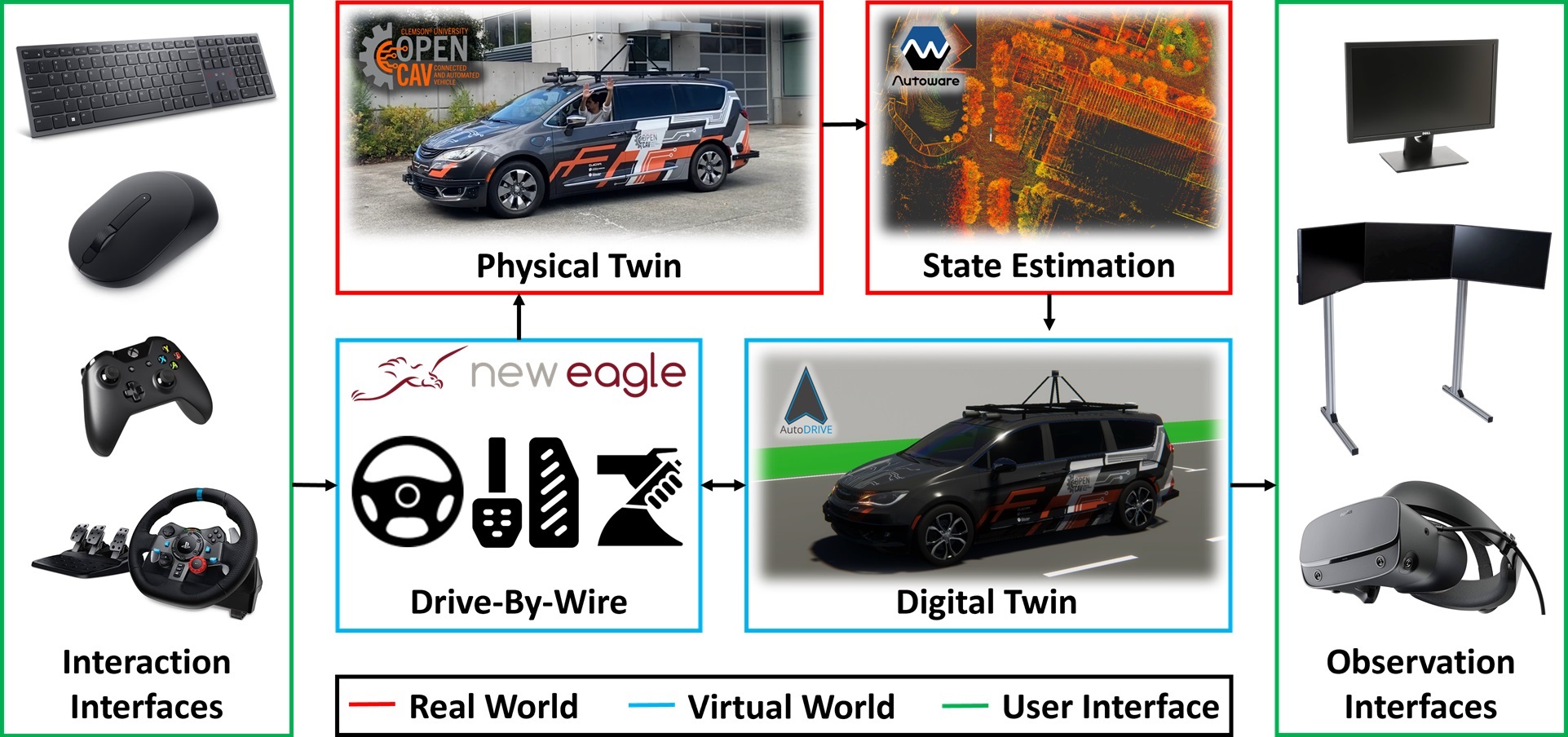Human Machine Interfaces to AutoDRIVE Simulator
This repository uses AutoDRIVE Ecosystem to realize an immersive digital twin framework for exploring human-autonomy coexistence. The source repository for AutoDRIVE Ecosystem can be found here.
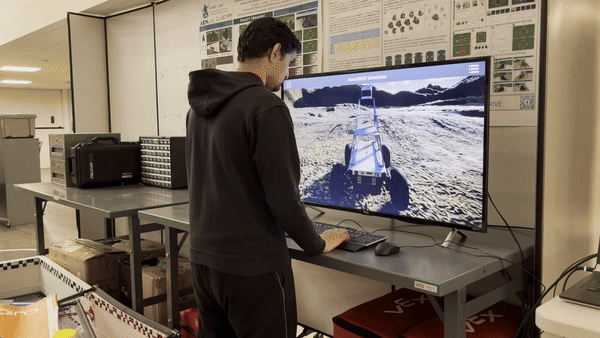 |
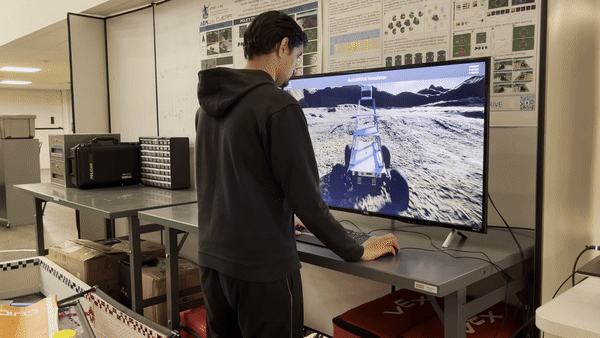 |
|---|---|
| Keyboard + Single Monitor Setup | Mouse + Single Monitor Setup |
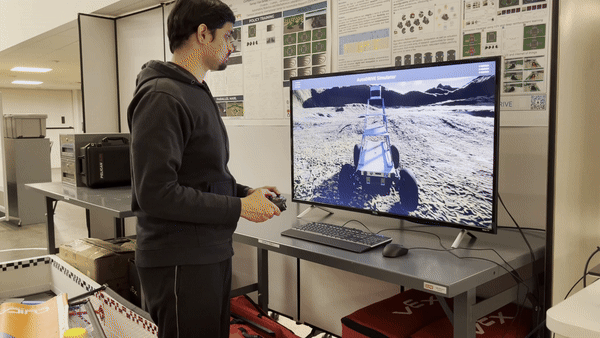 |
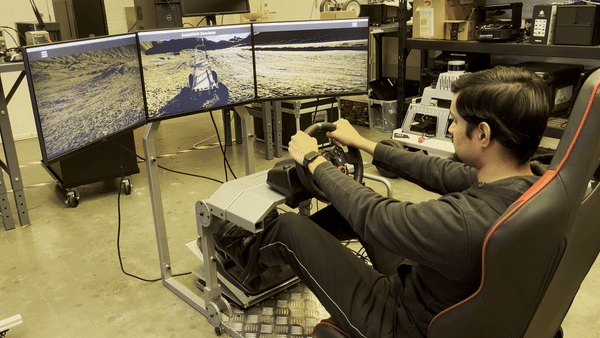 |
| Gamepad + Single Monitor Setup | Driving Rig + Triple Monitor Setup |
Observation Interfaces:
- Single Monitor
- Triple Monitor
- XR Headset
Interaction Interfaces:
- Keyboard
- Mouse/Trackpad
- Gamepad
- Driving Rig
In terms of observability, users can choose between different cameras, which allow first-, second-, and third-person viewing. These viewpoints can either be statically rendered on a single/triple-monitor display or dynamically rendered within a mixed-reality framework, which allows for a fully immersive user experience. For interaction, the input methods are mapped across varying scales and configurations of vehicles to allow intuitive control for user convenience. A detailed video highlighting various human-machine interfaces (HMIs) to observe and interact with the autonomy-oriented digital twins in AutoDRIVE Simulator is available on YouTube.
We administered the immersive presence of 16 users within the virtual environment of the proposed framework using the Bob G. Witmer Presence Questionnaire (PQ) [25], [26]. The questionnaire is made available as Presence Questionnaire.xlsx and the user demographics are recorded in Demographics.xlsx. Individual user responses for various observation and interaction interfaces are stored as CSV files within the User Study directory and are post-processed using the data_analysis.mlx script. Following are the post-processed user experience analyses for observation and interaction interfaces:
 |
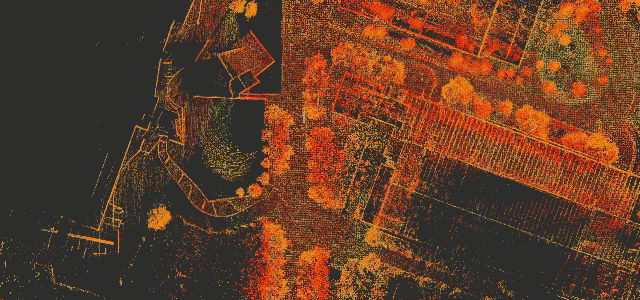 |
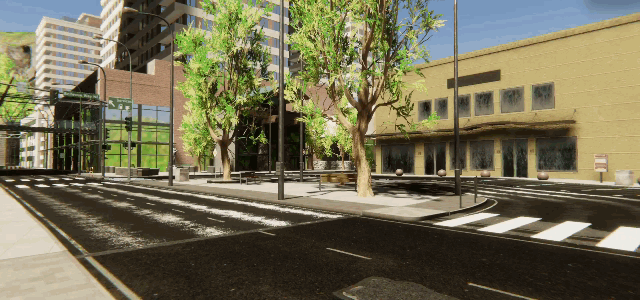 |
|---|---|---|
| Physical Twin | State Estimation | Digital Twin |
In order to evaluate the serviceability of the proposed framework, an edge-case urban driving scenario was devised. The scenario was laid out to jump-scare the ego vehicle and analyze its reactive response to the event. Particularly, the ego vehicle was supposed to keep driving straight unless it was unsafe/unethical to do so (e.g. dead end, traffic sign, traffic light, imminent collision, etc.). Down the road, a semiautonomous virtual vehicle was set up to cut across the ego vehicle as it approached the first 4-way intersection, requiring the ego vehicle to execute a panic-breaking maneuver while ensuring safety in case of any failures.
The individual runs for distinct modes of operation (AV, CAV, HV-S, and HV-D) are stored within the Case Study directory and are post-processed using the data_analysis.mlx script. The following plot depicts the ego vehicle behavior in autonomous (AV), connected autonomous (CAV), human-operated with static HMD (HV-S), and human-operated with dynamic HMD (HV-D) modes of operation:
A time-synchronized video highlighting the case-study is available on YouTube.
We encourage you to read and cite the following papers if you use any part of this dataset for your research:
Metaverse for Safer Roadways: An Immersive Digital Twin Framework for Exploring Human-Autonomy Coexistence in Urban Transportation Systems
@misc{Metaverse-for-Safer-Roadways-2024,
author = {Tanmay Vilas Samak and Chinmay Vilas Samak and Venkat Narayan Krovi},
title = {Metaverse for Safer Roadways: An Immersive Digital Twin Framework for Exploring Human-Autonomy Coexistence in Urban Transportation Systems},
year = {2024},
eprint = {2406.05465},
archivePrefix = {arXiv},
primaryClass = {cs.RO},
url = {https://arxiv.org/abs/2406.05465},
}This work has been accepted at 2024 IEEE Conference on Telepresence (TELEPRESENCE).
AutoDRIVE: A Comprehensive, Flexible and Integrated Digital Twin Ecosystem for Enhancing Autonomous Driving Research and Education
@article{AutoDRIVE-Ecosystem-2023,
author = {Samak, Tanmay and Samak, Chinmay and Kandhasamy, Sivanathan and Krovi, Venkat and Xie, Ming},
title = {AutoDRIVE: A Comprehensive, Flexible and Integrated Digital Twin Ecosystem for Autonomous Driving Research & Education},
journal = {Robotics},
volume = {12},
year = {2023},
number = {3},
article-number = {77},
url = {https://www.mdpi.com/2218-6581/12/3/77},
issn = {2218-6581},
doi = {10.3390/robotics12030077}
}This work has been published in MDPI Robotics. The open-access publication can be found on MDPI.
@inproceedings{AutoDRIVE-Simulator-2021,
author = {Samak, Tanmay Vilas and Samak, Chinmay Vilas and Xie, Ming},
title = {AutoDRIVE Simulator: A Simulator for Scaled Autonomous Vehicle Research and Education},
year = {2021},
isbn = {9781450390453},
publisher = {Association for Computing Machinery},
address = {New York, NY, USA},
url = {https://doi.org/10.1145/3483845.3483846},
doi = {10.1145/3483845.3483846},
booktitle = {2021 2nd International Conference on Control, Robotics and Intelligent System},
pages = {1–5},
numpages = {5},
location = {Qingdao, China},
series = {CCRIS'21}
}This work has been published in 2021 International Conference on Control, Robotics and Intelligent System (CCRIS). The publication can be found on ACM Digital Library.
